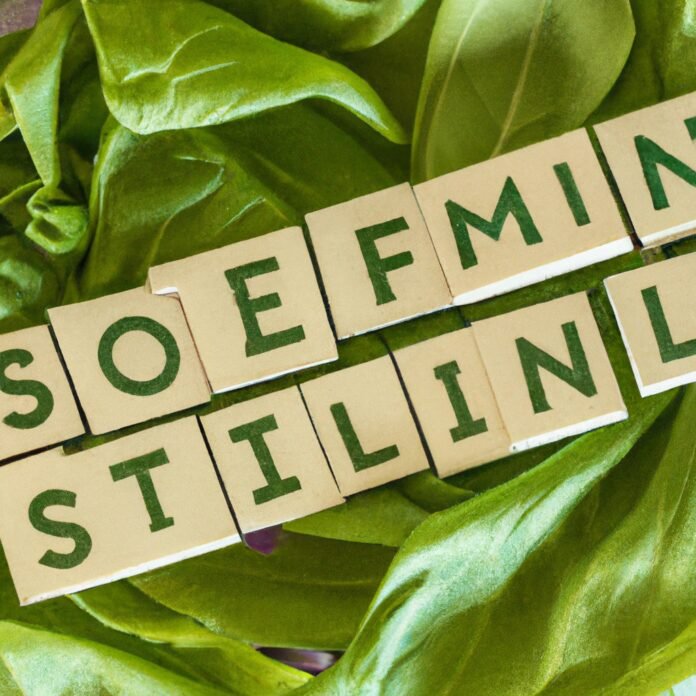Food has been the source of sustenance and nourishment for all living beings since the beginning of time. As humans have evolved and inhabited the Earth, the impact of our food consumption has greatly impacted the environment. It is now more important than ever to become conscious of how and what we eat, and ensure that we are making eco-friendly food choices with sustainable eating. In this article, we will explore the importance of sustainable eating, the environmental impacts of our current eating habits and the steps we can take to make more conscious and eco-friendly food choices.
1. A Taste of Change: Exploring Sustainable Eating
Are you ready to venture into the realm of sustainable eating?
It’s not as hard as it seems and you might be amazed to find out what a difference it can make to the planet.
Start by simply swapping out the products you typically buy for more sustainable alternatives.
- Say goodbye to processed foods and start experimenting with more seasonal dishes made from scratch.
- Say goodbye to meat-heavy meals and explore a delicious array of vegetarian and vegan recipes.
- Say goodbye to single-use plastics and start looking for sustainable alternatives, from reusable packaging to compostable utensils.
Sustainable eating isn’t just about swapping out ingredients; you can also switch up where you shop. Visit your local food market for fresh produce or join a community-supported agriculture (CSA) scheme to get seasonal fruits and vegetables. You can also look for responsibly sourced food at local health stores or higher-end grocery stores.
Shop with your conscience in mind, knowing that where you spend your money directly affects the planet. Are the growers being treated fairly, are they working with sustainable agro-ecosystems?
Look for organic, biodynamic and free-range food labels; these labels guarantee that the product has been produced without synthetic chemicals or hormones, and in a way that’s healthier for the environment, the animals and you.
Finally, reduce your food waste and rethink your portions. Eating sustainably is not just about what you buy; it’s also about how much you consume. Start small and you may find yourself surprised at the difference you can make. Try it out and see what a taste of change can do for you!
2. The Benefits of Eco-Friendly Food Choices
Making eco-friendly food choices can be incredibly beneficial in terms of conserving resources and reducing your carbon footprint. Here are some of the top reasons why:
- Eco-friendly food choices help combat climate change. Vegetarian and vegan meals typically have lower carbon emissions than dishes that include animal products.
- Choosing locally-sourced food cuts down on carbon emissions associated with shipping food from afar. So, try to buy from local farmers markets whenever possible.
- Growing or sourcing organic food allows you to support eco-conscious food producers who strive to reduce chemical inputs, conserve water, and preserve land.
Good Nutriton. Making an eco-friendly meal doesn’t mean sacrificing taste or nutrition. On the contrary, opting for natural, chemical-free, and locally-sourced food fuels your body with pure energy and boosts your well-being.
What’s more, using seasonal and regional ingredients can give your palate something different and exciting to look forward to every few months. Eating with the seasons can help you diversify and explore your culinary options.
Save Money. Eating an eco-friendly diet doesn’t always need to cost more. In many cases, sourcing locally-produced food and organic produce can actually save you money.
In addition, you can reduce waste by buying food items in bulk and purchasing them without packaging, so you don’t come home with bags of excess plastic.
3. Making Sustainable Eating an Everyday Reality
Engaging in sustainable eating habits is more than just an eco-friendly endeavor: it’s an incredibly empowering way to live. By making it an everyday reality, you can make a real change on your health and the environment.
Start by understanding what it means to eat sustainably. Sustainable eating is a holistic approach that takes into account where your food is coming from, how it’s being produced, as well as the environmental impact of the product. It’s a practice of conscious decision-making in which you take charge of what goes into your body.
When shopping for food, focus on nutrient-rich food from sustainable sources, such as organic or local producers that use natural agricultural methods. Look for food certified by ethical bodies, or buy fresh and seasonal produce whenever possible. Eating food high in quality ensures you’ll get the most out of it nutritionally.
As you shop, take into consideration how your food is packaged. By choosing foods in eco-friendly packaging or packaging options with less waste, you can help reduce waste in the environment. Additionally, if possible, avoid plastic packaging or opt for plastic materials which are biodegradable.
When cooking, strive for efficiency. Invest in good cookware and food-safe containers that you can reuse. Make sure not to overheat food as this can lead to nutrient and energy loss, and put leftovers in the refrigerator for later meals.
Finally, practice the three Rs of sustainability: reduce, reuse, and recycle. Incorporate these elements into your cooking and eating habits, and you’ll be well on your way to . Start small and commit to making the change, and you’ll soon reap the rewards of sustainable eating.
4. Celebrating the Future: A Greener Plate for All
The future of food lies in sustainability. By turning to renewable resources, sustainable farming practices, and diverse diets, we can create a greener plate for all. Here are four ways to celebrate the future of food and build a healthier, more torural world.
Eat Local, Seasonal Foods
- Choose local, seasonal produce when grocery shopping to benefit your local farmers and reduce food miles.
- Photosynthise local cuisine is a great way to enjoy your regional flavors and support the local economy
Reduce meat consumption
- Cutting down on meat consumption can help reduce your carbon footprint and improve your health.
- Opt for vegetarian meals at least once a week to decrease your environmental footprint.
Grow your own food
- Growing your own fruits, vegetables, and even meat can help you contribute to a greener plate while providing you with fresh and healthy food.
- Growing your own food reduces the need for chemical fertilizers, which can harm the environment.
Support farmers’ markets
- Visit your local farmers’ market to stock up on local and seasonal produce.
- By attending farmers’ markets, you can get the freshest fruits and vegetables while getting to know the people who grow your food.
By making small changes to our consumption habits, we can all contribute to a greener, more sustainable future. Celebrate the future of food and let’s build a healthier, more torural world together.
Making eco-friendly choices when it comes to food helps us align our diet with our values of living sustainably. As we strive to reduce our environmental impact, and preserve natural resources, sustainable eating is an essential step. With a few small swaps, your meals can make a positive change – now that’s something to chew on!

